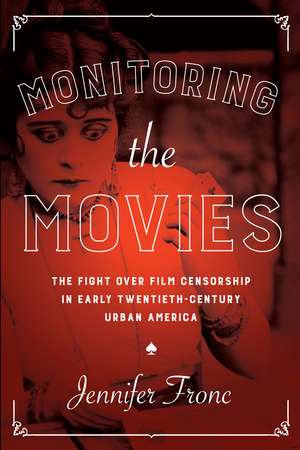Monitoring the Movies: The Fight over Film Censorship in Early Twentieth-Century Urban America
Autor Jennifer Froncen Limba Engleză Hardback – 10 dec 2017
Using the National Board’s extensive files, Monitoring the Movies offers the first full-length study of the NB and its campaign against motion-picture censorship. Jennifer Fronc traces the NB’s Progressive-era founding in New York; its evolving set of “standards” for directors, producers, municipal officers, and citizens; its “city plan,” which called on citizens to report screenings of condemned movies to local officials; and the spread of the NB’s influence into the urban South. Ultimately, Monitoring the Movies shows how Americans grappled with the issues that arose alongside the powerful new medium of film: the extent of the right to produce and consume images and the proper scope of government control over what citizens can see and show.
Preț: 530.22 lei
Preț vechi: 688.59 lei
-23% Nou
Puncte Express: 795
Preț estimativ în valută:
101.46€ • 106.20$ • 84.44£
101.46€ • 106.20$ • 84.44£
Carte tipărită la comandă
Livrare economică 31 martie-14 aprilie
Preluare comenzi: 021 569.72.76
Specificații
ISBN-13: 9781477313794
ISBN-10: 1477313796
Pagini: 216
Dimensiuni: 152 x 229 x 20 mm
Greutate: 0.45 kg
Editura: University of Texas Press
Colecția University of Texas Press
ISBN-10: 1477313796
Pagini: 216
Dimensiuni: 152 x 229 x 20 mm
Greutate: 0.45 kg
Editura: University of Texas Press
Colecția University of Texas Press
Notă biografică
JENNIFER FRONC is an associate professor of history at the University of Massachusetts–Amherst. She is the author of New York Undercover: Private Surveillance in the Progressive Era.
Cuprins
- Acknowledgments
- Introduction: The Origins of the Anticensorship Movement
- Chapter 1. The Lesser of Two Evils: Debating Motion Picture Censorship, 1907–1912
- Chapter 2. “Critical and Constructive”: The National Board’s “Standards” and City Plan for Voluntary Motion Picture Review, 1912–1916
- Chapter 3. “An Historical Presentation”: The Birth of a Nation and the City Plan, 1909–1917
- Chapter 4. “Is Any Girl Safe?” White Slave Traffic Films and the Geography of Censorship, 1914–1917
- Chapter 5. “Whether You Like Pictures or Not”: The General Federation of Women’s Clubs and State Censorship Legislation, 1916–1920
- Chapter 6. Southern Enterprises: Building Better Films Committees in the Urban South, 1921–1924
- Conclusion: Censorship and the Age of Self-Regulation, 1924–1968
- Appendix: A Partial List of Cities Cooperating with the National Board of Review, 1918
- Notes
- Bibliography
- Index
Recenzii
"Not unlike Facebook, the nascent movie industry resisted regulation; it fought back with self-imposed guidelines aided by the rhetoric of civil libertarians. Ranged against the studios were Puritans and Progressives, a coalition of moralizers, women’s groups concerned with the effect of movies on children and culture warriors who linked movies with the medium’s lowlife origins as burlesque sideshow attractions. . . Fronc has written an engaging and balanced account of questions whose debating points remain relevant today."
"Jennifer Fronc provides a needed history of the most far-reaching, and successful, organization to regulate motion pictures in the early 20th century: The National Board of Review...Fronc’s careful historical work reminds us that even among people who shared political sentiments—Progressive reformers, labor organizers, animal rights activists, and clubwomen—there was considerable disagreement about whether and how society should regulate motion pictures."
"A comprehensive and meticulously researched study...Fronc's book brings considerable scholarship and insight into the politics of efforts to regulate early American cinema and to their lingering effects on efforts to circumscribe the effects of film on what those prone to regulate viewed as vulnerable audiences."
"Fronc has made a well-researched contribution on a fascinating period of tug-of-war over early films. Film and free-speech historians will find Monitoring the Movies a comprehensive analysis of the censorship debate during the Progressive era and would welcome this impressively detailed book on the shelf."
Descriere
This deeply researched history investigates how Progressive-era activists sought to encourage the creation and consumption of high-quality films while lobbying against state-supervised motion picture censorship.
